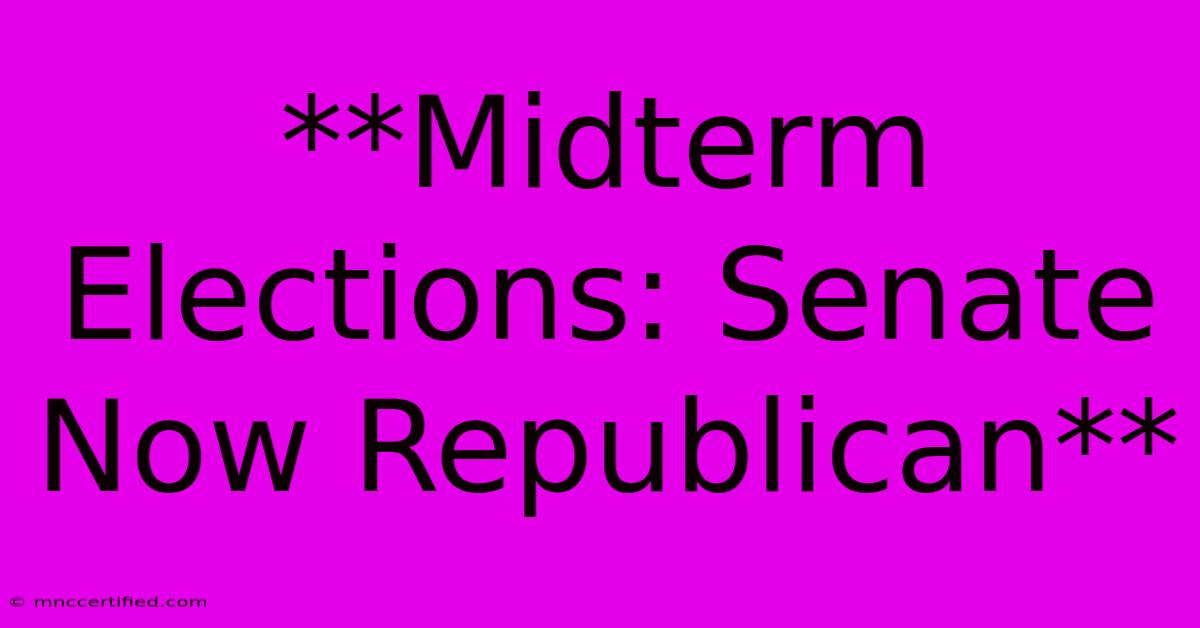**Midterm Elections: Senate Now Republican**

Table of Contents
Midterm Elections: Senate Now Republican, But What's Next?
The 2022 midterm elections have brought a significant shift in the U.S. Senate, with Republicans now controlling the chamber. While the final results are still being tallied in a few states, the outcome marks a notable change in the political landscape. This article explores the implications of this change, examining the potential impact on various areas of policy and the overall political climate.
A Tight Race, a Republican Win
The Senate race was particularly tight, with both parties vying for control. The GOP's victory was achieved through a combination of factors, including:
- Red wave momentum: The general feeling among voters was that a change was needed in Washington, leading to a favorable environment for Republican candidates.
- Campaign spending: Republicans outspent Democrats significantly, leveraging their resources to push their message and reach voters.
- Focus on key issues: Republican candidates emphasized issues like inflation and the economy, which resonated with voters facing financial strain.
The Republican Agenda: What to Expect
With control of the Senate, Republicans are poised to set the agenda for the next two years. Key areas of focus are likely to include:
- Economic policy: Republicans are expected to push for tax cuts and deregulation, aimed at stimulating economic growth.
- Energy policy: With a focus on energy independence, the GOP may seek to increase domestic oil and gas production.
- Social issues: Expect further debate on issues like abortion and LGBTQ+ rights, with Republicans pushing for stricter regulations.
- Government spending: Republicans are likely to push for spending cuts, potentially targeting social programs and infrastructure projects.
What Does This Mean for the Country?
The Republican majority in the Senate could lead to a period of increased political gridlock. The party's control of the chamber allows them to block legislation passed by the House of Representatives, potentially creating a stalemate on key issues.
However, there are also possibilities for bipartisanship:
- Finding common ground: On certain issues, such as infrastructure investment or cybersecurity, there may be potential for bipartisan agreements.
- Compromise: The need to reach a compromise on essential legislation could lead to a more collaborative approach.
Looking Ahead: Uncertainty and Opportunity
The Republican takeover of the Senate represents a significant shift in political power. This change will undoubtedly influence the direction of national policy in the coming years. The next two years will be a period of uncertainty, with the potential for both conflict and cooperation between the two major parties. How these dynamics unfold will shape the future of American politics and the lives of its citizens.
It's crucial to stay informed and engaged in the political process. This shift in power highlights the importance of civic participation, as individual voices can influence the course of the nation.
Key SEO Keywords:
- Midterm elections
- Senate
- Republican
- Democratic
- Political landscape
- Policy
- Gridlock
- Bipartisanship
- Economic policy
- Energy policy
- Social issues
- Government spending
- Civic participation
Off-Page SEO Strategies:
- Share this article on social media platforms using relevant hashtags.
- Engage with comments and discussions about the midterm elections on online forums.
- Participate in discussions on websites and platforms that focus on politics and current events.
- Build relationships with other websites and blogs covering similar topics.

Thank you for visiting our website wich cover about **Midterm Elections: Senate Now Republican**. We hope the information provided has been useful to you. Feel free to contact us if you have any questions or need further assistance. See you next time and dont miss to bookmark.
Featured Posts
-
Fc Barcelona News Headlines November 6 2024
Nov 07, 2024
-
Declan Rices Fitness Chelsea Inter Milan Updates
Nov 07, 2024
-
Gold Bond Medicated Powder Kills Bed Bugs
Nov 07, 2024
-
How To Add Pulsechain Network To Metamask
Nov 07, 2024
-
Lammy Aims To Reset Us Ties
Nov 07, 2024